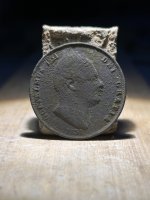Dozer D
Silver Member
- Feb 12, 2012
- 3,358
- 3,081
- Primary Interest:
- Other
When someone sells a large quantity of JUNK SILVER COINS, is there any governmental reporting involved, taxes, etc.? Are there limits that one can sell and still be under the guideline wires? Has anyone run into these types of red tape hang ups at time of sale, or even at income tax time "April 15"? Your comments for discussion.
Upvote
0






